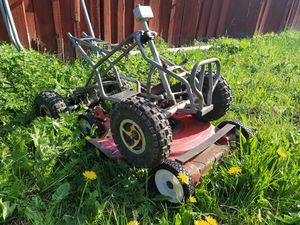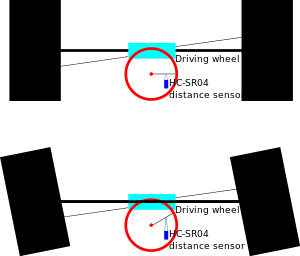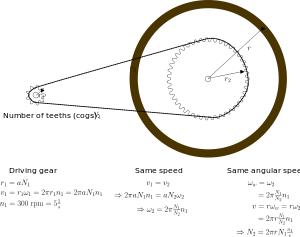Difference between revisions of "DIY Lawnmower 2023"
| Line 60: | Line 60: | ||
import drawsvg as draw | import drawsvg as draw | ||
import math as math | |||
d = draw. | def outline(r1, width, t1, t2): | ||
#Use degrees | |||
pi = 3.14159 | |||
r2 = r1 + width | |||
d.append(draw.ArcLine(0, 0, r1, t1, t2, | |||
stroke='black', stroke_width=1, fill='none', fill_opacity=0)) | |||
d.append(draw.ArcLine(0, 0, r2, t1, t2, | |||
stroke='black', stroke_width=1, fill='none', fill_opacity=0)) | |||
# | #Convert to rads | ||
t1 = -t1*2*pi/360 | |||
t2 = -t2*2*pi/360 | |||
d.append(draw.Lines( r1*math.cos(t1), r1*math.sin(t1), | |||
r2*math.cos(t1), r2*math.sin(t1), | |||
close=False, fill='none', stroke='black')) | |||
d.append(draw.Lines( r1*math.cos(t2), r1*math.sin(t2), | |||
r2*math.cos(t2), r2*math.sin(t2), | |||
close=False, fill='none', stroke='black')) | |||
#Draw the center hole | maxAngle = 60 | ||
d | |||
# Draw multiple circular arcs | |||
width = 4 # mm | |||
diff = 10 # | |||
diff_center = 10 #Extra difference from the center hole | |||
radius_center = 20 #mm | |||
d = draw.Drawing(400, 400, origin=( -2 -radius_center, -400 +1 + radius_center)) | |||
#Draw the center hole | |||
d.append(draw.ArcLine(0, 0, radius_center, 0, 360, | |||
fill='nore', stroke='black', fill_opacity=0)) | |||
# | |||
# 1st row | |||
# | |||
period = 2 #(one black strip, one white strip) | period = 2 #(one black strip, one white strip) | ||
phaseshift = 0 | phaseshift = 0 | ||
r1 = radius_center + diff_center + diff | |||
t1 = 0 | |||
t2 = maxAngle/period | |||
outline(r1, width, t1, t2) | |||
# | |||
# 2nd row | |||
# | |||
period = 2 #(one black strip, one white strip) | period = 2 #(one black strip, one white strip) | ||
phaseshift = maxAngle/(2*period) ##90 degrees | phaseshift = maxAngle/(2*period) ##90 degrees | ||
r1 = r1 + width + diff | |||
t1 = phaseshift | |||
t2 = maxAngle/period + phaseshift | |||
outline(r1, width, t1, t2) | |||
# | |||
# 3rd row | |||
# | |||
period = 4 #(one black strip, one white strip) | period = 4 #(one black strip, one white strip) | ||
phaseshift = maxAngle/(2*period) | phaseshift = maxAngle/(2*period) | ||
r1 = r1 + width + diff | |||
for i in range(0, 4, 2): | |||
phaseshift = maxAngle/(2*period) + | phaseshift = maxAngle/(2*period) + i*maxAngle/(period) | ||
t1 = phaseshift | |||
t2 = maxAngle/period + phaseshift | |||
outline(r1, width, t1, t2) | |||
# | |||
# 4th row; | |||
# | |||
period = 8 #(one black strip, one white strip) | period = 8 #(one black strip, one white strip) | ||
r1 = r1 + width + diff | |||
for i in range(0, 8, 2): | |||
phaseshift = maxAngle/(2*period)+i*maxAngle/(period) | |||
phaseshift = maxAngle/(2*period)+ | t1 = phaseshift | ||
t2 = maxAngle/period + phaseshift | |||
outline(r1, width, t1, t2) | |||
phaseshift | |||
# | # | ||
# Print it | # Print it | ||
# | # | ||
d.set_pixel_scale(2) # Set number of pixels per geometry unit | d.set_pixel_scale(2) # Set number of pixels per geometry unit | ||
#d.set_render_size(400, 200) # Alternative to set_pixel_scale | #d.set_render_size(400, 200) # Alternative to set_pixel_scale | ||
d.save_svg(' | d.save_svg('gray.svg') | ||
d.save_png(' | d.save_png('gray.png') | ||
# Display in Jupyter notebook | # Display in Jupyter notebook | ||
#d.rasterize() # Display as PNG | #d.rasterize() # Display as PNG | ||
d # Display as SVG | d # Display as SVG | ||
print( 'Total width: ', r1 + width, ' mm' ) | |||
</syntaxhighlight> | </syntaxhighlight> | ||
Revision as of 02:34, 22 July 2023
Introduction
2 wheel drive using kids ATV chassis with 3" wheels without differential but with steering, 2x350W motor; speed controller. The grass cutter is a part from an old lawn mower. The ATV is steerable, thus a rotation measurement device is needed so that the motor will not burn.
https://www.kuldnebors.ee/search/search.mec?pob_action=search&search_O_string=atv&search_source=kwc
Arduino + GPS + IMU (Differential GPS).
Consider also
- ArduPilot https://ardupilot.org/rover/docs/gettit.html
- Cube Orange https://ardupilot.org/copter/docs/common-thecubeorange-overview.html
- OpenMower
Theory
Steering
The angles needed are:
The motion of steering is restricted, thus the angle need to be measured. Two easy options:
- Use distance sensor (HC-SR04), or
- Use rotary encoder (single or multi track gray code)
Add the limit sensors to both.
Distance sensor HC-SR04
- Dependent on ambient temperature.
- Ping rarely so that no echoes.
- Tests on accuracy
Gray code
- In a gray code the bit distance between two consecutive words is exactly one (mono-difference).
- Accuracy:
- Absolute Position Coding Method for Angular Sensor—Single-Track Gray Codes
- The Structure of Single-Track Gray Codes
- Finding Single Track Gray Codes with SAT
Include the most significant bit (varies most) to outer circle.
Mechanics.
Python code
Python code to generate the gray code image
#
# Use sxiv to continously display the image
#
#
import drawsvg as draw
import math as math
def outline(r1, width, t1, t2):
#Use degrees
pi = 3.14159
r2 = r1 + width
d.append(draw.ArcLine(0, 0, r1, t1, t2,
stroke='black', stroke_width=1, fill='none', fill_opacity=0))
d.append(draw.ArcLine(0, 0, r2, t1, t2,
stroke='black', stroke_width=1, fill='none', fill_opacity=0))
#Convert to rads
t1 = -t1*2*pi/360
t2 = -t2*2*pi/360
d.append(draw.Lines( r1*math.cos(t1), r1*math.sin(t1),
r2*math.cos(t1), r2*math.sin(t1),
close=False, fill='none', stroke='black'))
d.append(draw.Lines( r1*math.cos(t2), r1*math.sin(t2),
r2*math.cos(t2), r2*math.sin(t2),
close=False, fill='none', stroke='black'))
maxAngle = 60
# Draw multiple circular arcs
width = 4 # mm
diff = 10 #
diff_center = 10 #Extra difference from the center hole
radius_center = 20 #mm
d = draw.Drawing(400, 400, origin=( -2 -radius_center, -400 +1 + radius_center))
#Draw the center hole
d.append(draw.ArcLine(0, 0, radius_center, 0, 360,
fill='nore', stroke='black', fill_opacity=0))
#
# 1st row
#
period = 2 #(one black strip, one white strip)
phaseshift = 0
r1 = radius_center + diff_center + diff
t1 = 0
t2 = maxAngle/period
outline(r1, width, t1, t2)
#
# 2nd row
#
period = 2 #(one black strip, one white strip)
phaseshift = maxAngle/(2*period) ##90 degrees
r1 = r1 + width + diff
t1 = phaseshift
t2 = maxAngle/period + phaseshift
outline(r1, width, t1, t2)
#
# 3rd row
#
period = 4 #(one black strip, one white strip)
phaseshift = maxAngle/(2*period)
r1 = r1 + width + diff
for i in range(0, 4, 2):
phaseshift = maxAngle/(2*period) + i*maxAngle/(period)
t1 = phaseshift
t2 = maxAngle/period + phaseshift
outline(r1, width, t1, t2)
#
# 4th row;
#
period = 8 #(one black strip, one white strip)
r1 = r1 + width + diff
for i in range(0, 8, 2):
phaseshift = maxAngle/(2*period)+i*maxAngle/(period)
t1 = phaseshift
t2 = maxAngle/period + phaseshift
outline(r1, width, t1, t2)
#
# Print it
#
d.set_pixel_scale(2) # Set number of pixels per geometry unit
#d.set_render_size(400, 200) # Alternative to set_pixel_scale
d.save_svg('gray.svg')
d.save_png('gray.png')
# Display in Jupyter notebook
#d.rasterize() # Display as PNG
d # Display as SVG
print( 'Total width: ', r1 + width, ' mm' )
Borderline only
Wheels and tires
Using an old kids ATV; 3" wheels; too small for pushing the snow, but perhaps enough for the first project.
Cheap axis:
- 125cc 835 mm, 55.90€: https://www.tuontitukku.fi/pienkone-vene-ja-varaosa/monkija-125cc-taka-aksila-835-mm-taka-aksila-monkijaan-83-5-cm/p/6419773800559/
- Takanapa 4x110 Mikilon Pentora 125cc; 32.90€: https://www.tuontitukku.fi/pienkone-vene-ja-varaosa/takanapa-4x110-mikilon-pentora-125cc-taka-akselille-jossa-19-os-20mm-boori/p/9977000025276/
Ulkohalkaisija täynnä noin 36cm (6")
Current
Heat Dissipation
Motor
Motor Bed plan: keep is as simple as possible. Note that no welding machine, and other metal tools are scarce.
Torque, Speed, Duty Cycle
The gear is standard 410-9T bicycle chain. Thus, the gears from bicycles will be used for steering and driving. The wheel diameter is 3" (18 cm?), and the front gear is 9 spokes and the maximum rpm is 300. Thus, we have for the back gear
Vevor 24V 350W Nennstrom: 18,4A Brushed Permanentmagnetmotor Gear Reduction Packungsgröße: 22 x 19 x 17 cm (8,66 x 7,48 x 6,69 Zoll) Bruttogewicht: 3,05 kg
9 Zahnrad für Kette Nr. 410, Teilung 12,7 mm. Besonders gut für Heimwerker geeignet, da der Antrieb mit Standard-Fahrradketten (1/2 Zoll Teilung) kompatibel ist
Motor Speed Controller BTS7960
We use BTS7960 based speed controller IBT-2 with max 43 Amps current. The datasheet is available at https://electropeak.com/learn/download/bts7960-43a-motor-driver-datasheet/
Example code from Electropeak or Hessmer
Pins
- VCC: 5V
- GND: Ground
- IS-R: Input signal for detecting high current – Straight rotation
- IS-L: Input signal for detecting high current – Inverse rotation
- EN-R: Output Signal for controlling motor direction – Straight rotation
- EN-L: Output Signal for controlling motor direction – Inverse rotation
- WM-R: PWM Signal for controlling motor speed – Straight rotation
- PWM-L: PWM Signal for controlling motor speed – Inverse rotation
Motor pins (High current):
- M+: Motor Positive; M-: Motor negative
- B+: Battery positive; * B-: Battery negative
Some instructions:
- https://www.homemade-circuits.com/dc-motor-speed-controller-circuits/
- https://howtomechatronics.com/tutorials/arduino/arduino-dc-motor-control-tutorial-l298n-pwm-h-bridge/
- https://howtomechatronics.com/tutorials/arduino/arduino-dc-motor-control-tutorial-l298n-pwm-h-bridge/
Extra things and older thoughs.
Use PWM. Feedback? Arduino L298N H-bridge.
Arduino pwm motor controller 300W 36V 20Amps
- https://www.pololu.com/product/755
- https://www.infineon.com/cms/en/product/evaluation-boards/bldc-shield_ifx007t/
- https://www.infineon.com/cms/en/product/evaluation-boards/kit_xmc47_relax_5v_ad_v1/
- https://www.canakit.com/50a-dc-pwm-motor-speed-controller.html
https://electropeak.com/learn/interfacing-bts7960-43a-high-power-motor-driver-module-with-arduino/
High power dc motor speed controller
- https://www.ebay.de/itm/255283289430?hash=item3b7011dd56:g:ooAAAOSwhexb6eW9&amdata=enc%3AAQAIAAAA4Gjfo%2FMILLwl3G9ygIqNAj7fpl%2FtigoAQMba%2FwqTqxj%2F4nqjin1d6Re7Jqa2XBzZBTYTsTZEUjiXEhH%2BpvJd1RaWoR5%2FsWhgtcwpXnTrpL1Y5wDPHZ1wJJTmdK4mb4LOQLw%2BmqT%2B9tcOBX%2BAwD37WZcEfTk3P5B6boz%2BRV7G1fj3KiqeZ%2B0ZA98o9mIFBOG2E6fxDo9K3cQN2u5M53jQ7PrP6%2BjtJTGNnfCQA0tuOE8V8bAfFmBRCnPAFt001aTDSAUCuyxzZNQK%2FaKJMdzbLnmLjxgPMQmkSpSDCFQrBg8D%7Ctkp%3ABFBM6Ie9uvph
- Amazon: Songhe BTS7960 43A, HiLetgoBTS7960 43A, Melife PWM 10-50V 60A,
- https://www.ebay.de/itm/123021644824?hash=item1ca4a95418:g:nbkAAOSwFwlgA~qm&amdata=enc%3AAQAIAAAA4D2ya%2FD4v6plC%2B8Wi7%2BlXiqyFvx9ZVmTFiGrhSZCNY2YnjdXjYQSdBGKApiC33DWt5chAE5RKlktpUjFvfAH7zshCx42W8yONOQ4zchZuo1246qn5qB8HmRBhVVuQ4urPQKY5239P%2FA%2BODko%2BEp8V0A2%2FuEAhTO2Dxs5GGNBIJL45pGyQFEMNEa8NpisE0ebKnTokdhtuJVPQNap6U0DW1jeEwasXUUanOoWC0uDn%2Bt2gC3ulFIBbXn1epQw3wCnTR1iOv%2BRR%2Fz5KjKpYRsaZfmprbV7gONgMIgdZ3QgdJ%2B6%7Ctkp%3ABk9SR7rT4rf6YQ
- https://www.ebay.de/itm/165676940912?hash=item26931d7e70:g:q8YAAOSwVM1jIqNq&amdata=enc%3AAQAIAAAA4CKa5nRcyz0RlXcN3Iw7mhcTalyBSBfC33bdLn08wqjCcgaPgKgjMgdkmbwdwGTC6QibwZ7WjVqyWysp7Uh97reXnrw5Srml4CJ9O%2FyBC8wqga6cohaq7tBAZOgFx9G1PP9PzZ7QEYWiGCiR4%2F55MdLP8kI%2B4gynCWyknKAlshev5BExzvKvazuC0SGQQEqT6WFZy6m%2Bp1jw7jwGlg8I8dFZ0O5s%2Fizj6E7DzlotaLFb8OiyJKRzpuPZSo2vpAM2Q5831W6kODRgLCo0N0QlmaU5HUxUq4AEXCiPrsit0W7R%7Ctkp%3ABk9SR7zT4rf6YQ
- MD25HV https://makermotor.com/pn00218-cyt13-25amp-7v-58v-high-voltage-dc-motor-driver-speed-controller-md25hv/
Radio controller
We chose Flysky FS-i6X RC Radio Sender & FS-IA10B Set 10-Kanal 2,4 GHz AFHDS unit to send and receive data.
// https://medium.com/@werneckpaiva/how-to-read-rc-receiver-signal-with-arduino-54e0447f6c3f
#define CH1 3
#define CH2 5
#define CH3 6
#define CH4 9
#define CH5 10
// Read the number of a given channel and convert to the range provided.
// If the channel is off, return the default value
int readChannel(int channelInput, int minLimit, int maxLimit, int defaultValue){
int ch = pulseIn(channelInput, HIGH, 30000);
if (ch < 100) return defaultValue;
return map(ch, 1000, 2000, minLimit, maxLimit);
}
// Red the channel and return a boolean value
bool redSwitch(byte channelInput, bool defaultValue){
int intDefaultValue = (defaultValue)? 100: 0;
int ch = readChannel(channelInput, 0, 100, intDefaultValue);
return (ch > 50);
}
void setup(){
Serial.begin(115200);
pinMode(CH1, INPUT);
pinMode(CH2, INPUT);
pinMode(CH3, INPUT);
pinMode(CH4, INPUT);
pinMode(CH5, INPUT);
}
int ch1Value, ch2Value, ch3Value, ch4Value;
bool ch5Value;
void loop() {
ch1Value = readChannel(CH1, -100, 100, 0);
ch2Value = readChannel(CH2, -100, 100, 0);
ch3Value = readChannel(CH3, -100, 100, -100);
ch4Value = readChannel(CH4, -100, 100, 0);
ch5Value = redSwitch(CH5, false);
Serial.print("Ch1: ");
Serial.print(ch1Value);
Serial.print(" Ch2: ");
Serial.print(ch2Value);
Serial.print(" Ch3: ");
Serial.print(ch3Value);
Serial.print(" Ch4: ");
Serial.print(ch4Value);
Serial.print(" Ch5: ");
Serial.println(ch5Value);
delay(500);
}
Cutted parts and files
Inkscape's G Code generator, or use JsCut
Rotation detector. Plasma cutter.
- Center hole: diameter 20 mm.
- Width: 14 cm.
Steering gear plate:
- Just two holes
- Distance between hokes 56 mm.
Driving gear plate
- Just some holes.










